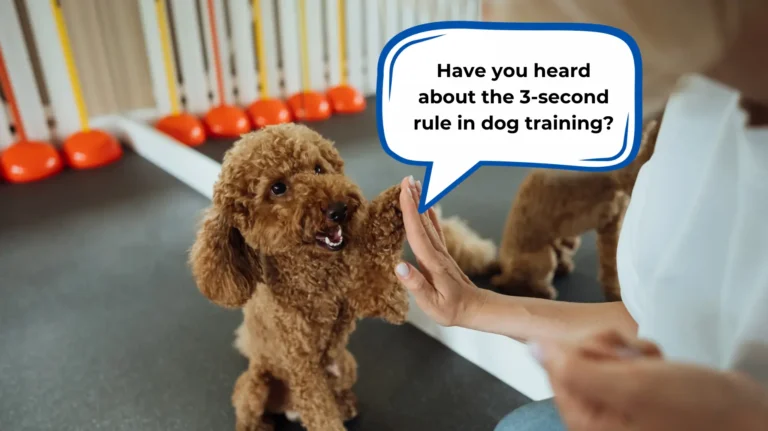Finding the best vet for your pet is saying yes to a partnership that will make a significant impact on your dog’s health. Making this choice matters!
When my pets show signs of health issues, I race straight to a vet. I have complete trust and respect for these professionals. However, after my fair share of vet trips, I can say from experience that not all vets are the same!
JOIN MY FREE REACTIVITY CLASS

Not all vets in your area will be compatible with you or your pet. Since we’re putting our dogs’ health on the line, we can never be too careful when finding the best vet.
In this blog, we’re going to talk about my experiences with vets, why choosing a vet can be a journey, and things to consider when making this big decision.
Key Takeaways
- Don’t put all your trust in one vet. Explore your options until you find the best dog veterinarian that matches you and your pet.
- It’s not wrong to ask for a second opinion, especially regarding your dog’s treatment plan.
- Many vet red flags can help you filter your options right off the bat.
STOP REACTIVITY TODAY (FREE CLASS)
Table of Contents
- My Journey to Finding the Best Vet: My Personal Experiences with Two Different Veterinarians
- When Should I Start Finding the Best Veterinarian for My Dog?
- How to Find the Best Dog Vet: 7 Factors to Consider
- Questions to Ask When Choosing a Vet
- Are There Vet Red Flags I Should Be Aware Of?
- Conclusion: You Can Be Picky With Your Vets. Your Beloved Pet’s Life Is On The Line.
My Journey to Finding the Best Vet: My Personal Experiences with Two Different Veterinarians
I’ve worked with several veterinarians in my life, but these two stories will always stand out.
Why?
These experiences taught me something: finding the best vet that matches your pet’s care needs can take a lot of trial and error, and it’s crucial to go through the trials and errors early.
If you’re in the process of looking for the best vets for your dogs, I hope these stories can help.
Story #1: Finding the Best Vet Helped Me Save $4,000
Vet visits are expensive! I’m sure I’m not the only one making a guesstimate of the total fees before we reach the pet doctor’s office.
After bringing Inca to her vet, we learned she had a ripped cruciate ligament. An operation to correct this issue would cost $4,000.

For Inca, I was ready to dig deep, find the $4K, and go for it.
Fortunately — and this is what made the mark — the pet doctor told me that because of Inca’s small size, we could opt for no surgery without worrying about Inca being in pain or getting worse.
After getting reassurance, we decided not to go for surgery. Inca didn’t get worse, and she lived for another five years.
Things could have been different if the vet had not told me I had an option!
The surprise on my face could have told him I was surprised, but it was such a good surprise! I’m grateful for that veterinarian who truly cared for Inca and her owners!
Story #2: I Was Told My Cat Has Cancer! Until I Went To a Holistic Vet
I had a cat suffering from lethargy, hair-loss, and significant weight loss. My frantic wife pleaded with me to take her to a good vet. So, I took my cat to the vet where she underwent several tests.

After rounds of tests, we were told that our cat had cancer and would need expensive chemotherapy that would cost us $3,000.
However, something inside me didn't feel right.
I don’t think my cat has cancer, I thought to myself.
So, I decided to seek a second opinion from a holistic vet.
The holistic vet quickly identified the problem as an ingredient in my cat's food. They recommended natural supplements and a chicken and rice diet.
Within just 48 hours, my cat had doubled in weight and went on to live for another five years!
I asked the holistic vet about cancer, and he assured me that my cat did not have it. This experience taught me the importance of being careful in choosing the right veterinarian for my pet.
This pet food dilemma reminded me of my Podcast on Integrative Dog Medicine Providing Natural And Safe Vet Care with Dr. Judy Jasek. We talked about why your dog and cat food can be sneaky culprits!
When Should I Start Finding the Best Vet for my Dog?
If you are a pet owner, it is essential to find the right vet before any emergency arises. Waiting until your furry friend is sick or injured can lead to a frantic search for a vet and a rushed decision on your part.

By finding the right vet early on, you can establish a relationship with them. This helps make you feel comfortable and confident when seeking medical attention for your pet. Look for a vet that is conveniently located, has flexible hours, and has experience treating your pet's species and breed.
Reading reviews from other pet owners can also provide valuable insight into a vet's reputation and level of care. Don't wait until an emergency occurs; choose the right vet early.
LEARN THE DOG CALMING CODE (FOR FREE)
How to Find the Best Dog Vet: 7 Factors to Consider
#1: Choose a Vet That Makes You Feel at Home with Their Service
I’m a big believer of energy. We can sense it. Even pets feel it.

Right off the bat, you will know if it’s the right vet place from the moment you step into the vet’s office. Listen to your gut because it’s a great guide in your search.
When you and your pet feel comfortable with your vet, you are more likely to seek necessary medical attention. A great advantage for your furry friend!
FREE REACTIVITY MASTERCLASS
A vet that provides personalized and attentive care, and communicates effectively with you, can help you make informed decisions about your pet's health. When you’re confident with the vet you’re working with, you can be at ease, alleviating any anxiety or stress you or your pet may experience during visits.
#2: Finding the Best Vet : Go for One Who Shares Your Pet Care Philosophies
Finding a vet that shares your pet care philosophies is important because it ensures that your pet receives the kind of care that aligns with your values and beliefs.

A vet who shares your philosophy on pet care will be more likely to understand your concerns and preferences, and work with you to create a personalized care plan for your pet.
For example, if you prefer a holistic approach to pet care, you may want to find a vet that specializes in alternative therapies. On the other hand, if you prefer traditional medicine, you may want to find a vet that is experienced in conventional treatments.
By finding a vet that shares your pet care philosophies, you can establish a partnership that is based on trust, open communication, and a shared commitment to your pet's well-being.
#3: Go For the Best Vet for Dogs That Truly Listens to You
Finding a vet that truly listens to you is important because it allows for better communication and a more effective partnership in caring for your pet. As a pet owner, you know your pet best and can provide valuable insights into their behavior and health.

A vet who listens attentively to your concerns, questions, and observations can gain a better understanding of your pet's needs and work with you to develop a personalized care plan.
#4: Prioritize Finding the Best Vet That Presents All Options
A vet who presents all treatment options, including both conventional and alternative therapies, can help you choose the best course of action based on your pet's specific needs and your personal preferences.
#5: Choose a Vet Office with Great Staff
Friendly, knowledgeable, and compassionate staff in the vet office can help ease the worry and anxiety you and your pet might be experiencing.

They are often the first point of contact when scheduling appointments, asking questions, or requesting information, so it's important to find a team that is responsive, respectful, and communicative.
GET MY 5 GOLDEN RULES FOR FREE!
#6: See If Their Emergency and After-Hours Policy Fit Your Needs
I always tell pet owners to be aware of after-hours and emergency policies, especially if they often deal with their dog’s sudden health issues.
Not all dogs are the same, and your dog might have conditions that require vets that cater to emergency trips.
#7: When Looking for the Best Vet, Check the Reviews From Other Pet Owners You Trust
Reading and listening to reviews from other pet owners you trust can be very helpful when trying to find a veterinarian for your dog. This is because reviews provide insights into the quality of care and services that a veterinarian provides, and can give you an idea of what to expect if you choose to use their services.

You also can get a better sense of the overall reputation of a veterinarian and make a more informed decision about whether or not to use their services.
Questions to Ask When Finding the Best Vet
Choosing the right vet for your pet is crucial for their health and well-being. Here are some questions to ask before making a decision.
QUESTION #1: Should I Go for Traditional or Holistic Vet?
This decision all boils down to your pet care philosophies. Like what I shared about how a holistic veterinarian cleared out that my pet did not have cancer, you should listen to your gut if traditional vet solutions don’t sit well with you.

Holistic veterinarians use a variety of natural and alternative therapies in their practice, such as acupuncture, herbal medicine, homeopathy, and nutrition therapy, to promote healing and balance in the animal's body.
They may also incorporate conventional Western medicine techniques, such as surgery and prescription medications, when necessary.
One of the biggest advocacies of holistic veterinarians is healing the non-evasive way. Instead of just focusing on the problem presented, holistic vets also check for other factors like pet lifestyle and food.
Which reminds me of this awesome Podcast with Dr. Ryan Alarid where we talk about how healthy food recipes can help your pet beat cancer!
If you feel like holistic vets fit your pet care preferences more, you should go for it.
Question #2: Does the Vet Have an Experience with Treating Pets Like Mine?
Some breeds of dogs are more prone to certain health issues than others, such as hip dysplasia in large breed dogs or dental issues in small breed dogs.
A veterinarian who has experience in treating these specific issues and breeds may be better equipped to identify and address potential health concerns in their patients.

A vet that is used to working with cases similar to what ails your dog, can understand your pet’s needs better. They may be able to offer more specialized guidance on topics such as training, socialization, and nutrition to ensure that the pet is receiving optimal care.
Veterinarians who have a history of treating certain types of dogs may also have established relationships with other specialists and resources that may be helpful in managing your pet's health.
Question #3: Do I Have the Budget for the Services of the Vet I Have Chosen?
Pet care is hefty, yes, but it’s not wrong to go for a veterinarian that can make the most out of your budget.

The downside of going for the most popular vet is you might get a pet care plan that’s difficult to finish because of budget constraints.
During your search for the best vet for your dogs, look for a professional willing to work on your budget, in the ideal way possible.
Question #4: Is My Gut Telling Me Something Else?
You are the pet owner. You know your dogs’ pain in ways only a pet parent can understand.
Listening to your gut can help you make the major decision of choosing a vet.

Like what happened when we received a cancer diagnosis for our ailing cat, everything changed when I listened to my gut and went for a second opinion from a holistic vet.
Listen to your gut!
Are There Vet Red Flags I Should Be Aware Of When Finding the Best Vet?
Choosing the best vet for dogs that you can finally trust is a journey, but there are red flags that can help you filter your choices right from the start.
Here are vet red flags to be aware of:
Red Flag #1: When Finding the Best Vet, Be Aware of Poor Communication Skills
If a vet is not willing to listen to your concerns, answer your questions, or explain treatment options, or take the time to tell you why they opt for certain treatments, it may be a red flag.

Red Flag #2: Lack of Transparency
If a vet is not forthcoming about their qualifications, fees, or treatment plans, it may be a red flag. Imagine the relief, assurance, and peace of mind you get when your vet give crystal-clear answers to your concerns.
Red Flag #3: Overly Aggressive Treatment
If a vet recommends aggressive or expensive treatment without first exploring less invasive options, it may be a red flag.
Red Flag #4: Unsanitary Conditions
If the veterinary clinic appears dirty, disorganized, or poorly maintained, it may be a reflection of the kind of pet care you can get from them.
Red Flag #5: Lack of Compassion
If a vet seems dismissive or indifferent to your pet's health and well-being, it may be a red flag.
Red Flag #6: No Emergency Protocol
If the veterinary clinic does not have an emergency protocol in place or does not offer 24-hour emergency care, it may be a red flag.
Red Flag #7: Poor reviews or Reputation
If the veterinary clinic has consistently poor reviews or a bad reputation in the community, it may be a red flag.

REVERSE REACTIVITY (FREE WEB CLASS)
Conclusion: When Finding the Best Vet, It’s OK to Be Meticulous; Your Beloved Pet’s Life Is On The Line.
Veterinarians are human beings, too. They make mistakes, and they can fall short in being “THE” vet that your furbaby needs.
There are amazing vets in the industry, and just like in any industry, there are also not-so-great ones.
That being said, I hope it’s clear to dog owners that it’s okay if you feel like you need to switch vets. Don’t put your trust in one vet. Explore your options. Our dogs deserve the best, and that includes going to a vet that knows exactly what to do.
Happy vet-finding!

~ Doggy Dan






